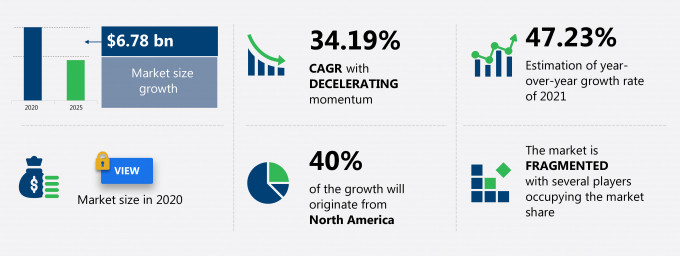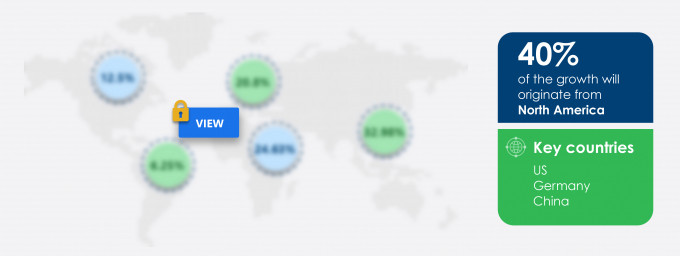The artificial intelligence in energy market share is expected to increase by USD 6.78 billion from 2020 to 2025, and the market’s growth momentum will decelerate at a CAGR of 34.19%.
This artificial intelligence in energy market research report provides valuable insights on the post COVID-19 impact on the market, which will help companies evaluate their business approaches. Furthermore, this report extensively covers artificial intelligence in energy market segmentations by solution (software, hardware, and services) and geography (North America, Europe, APAC, MEA, and South America). The artificial intelligence in energy market report also offers information on several market vendors, including ABB Ltd., Alphabet Inc., Flex Ltd., General Electric Co., Intel Corp., International Business Machines Corp., Microsoft Corp., Origami Energy Ltd., Siemens AG, and Verdigris Technologies Inc. among others.
What will the Artificial Intelligence In Energy Market Size be During the Forecast Period?
Download the Free Report Sample to Unlock the Artificial Intelligence in Energy Market Size for the Forecast Period and Other Important Statistics
Artificial Intelligence In Energy Market: Key Drivers, Trends, and Challenges
Based on our research output, there has been a positive impact on the market growth during and post COVID-19 era. The growing demand for data integration and visual analytics is notably driving the artificial intelligence in energy market growth, although factors such as existing issues of ai may impede market growth. Our research analysts have studied the historical data and deduced the key market drivers and the COVID-19 pandemic impact on the artificial intelligence in energy market industry. The holistic analysis of the drivers will help in deducing end goals and refining marketing strategies to gain a competitive edge.
Key Artificial Intelligence In Energy Market Driver
One of the key factors driving the global AI market is the growing demand for data integration and visual analytics. Rising proliferation and complexity have made the process of deploying and maintaining reliable data interfaces difficult. Enterprises around the world are, therefore, adopting data integration solutions. AI allows real-time synthesizing of data to facilitate real-time analysis for effective decision-making, thus enabling enterprises to monitor, transform, and deliver data; understand business processes; and bridge the gap between businesses and IT. Similarly, AI helps energy companies to integrate technical and business process data from different sources and convert them into meaningful business insights. With the exponential increase in data volume, the need for analyzing, transforming, monitoring, and interpreting data has become a priority for business operations. With globalization, customers, suppliers, and companies are scattered across the world and require real-time information exchange. To accomplish this, energy companies require AI platforms to link multiple enterprise systems with the web and cloud-based applications. Additionally, energy companies are integrating data with AI-powered video analytics systems to explore and analyze various types of data, such as sales data, for informed decision-making. Enterprises are also integrating business analytics software with their businesses for the dynamic representation of data. Hence, the demand for AI in the energy sector is likely to increase significantly during the forecast period.
Key Artificial Intelligence In Energy Market Trend
Increasing adoption of cloud-based solutions is another factor supporting the global AI market growth in the forecast period. With the increasing applications of robotics in repetitive and risky tasks, end-users are increasingly seeking avenues to ensure the elimination of limitations of industrial automation and robotics technologies. These limitations arise due to factors such as the cost, computational capacity, storage, size, power supply, motion mode, and working environment. Thus, the adoption of cloud-based AI solutions is increasing in the energy sector to enhance the capabilities of existing systems. Furthermore, the emergence of AI-as-a-service (AIaaS) is trending among various industrial users of AI, as it allows individuals and companies to access AI for various applications without large initial investment and with a lower risk of failure. AIaaS can allow energy companies to experiment on samples of multiple public cloud platforms to test various machine learning algorithms. AIaaS helps vendors in the market to increase their awareness about AI and its benefits, such as efficiency and maintenance of a company’s grid system and asset management of solar farms and gas plants. Companies like Alphabet, IBM, and GENERAL ELECTRIC are investing heavily in the development of prediction and maintenance systems for the energy industry and are planning to deploy these systems on the cloud in the near future.
Key Artificial Intelligence In Energy Market Challenge
Existing issues of AI will be a major challenge for the global AI market during the forecast period. Advanced hardware will enable advanced simulations and calculations and at a much faster rate. The creation of efficient algorithms that can make logical assumptions and solve puzzles more easily and at a higher speed remains another challenge for the market. The solution is to develop efficient problem-solving methods and algorithms that can help AI in solving problems faster at the software level. The central problem with AI is to develop a self-improving algorithm, which is also known as machine learning. Creating an AI from machine learning makes AI powerful and capable of solving old and new problems, which were earlier programmed by a human. However, developers are still in the research stage to develop an efficient machine learning algorithm, which can efficiently work with the energy management system. Therefore, there is limited adoption of AI in the energy sector in 2018. Solving these issues would remove the biggest roadblocks to the development of intelligent and faster AI that is more efficient and easier to develop.
This artificial intelligence in energy market analysis report also provides detailed information on other upcoming trends and challenges that will have a far-reaching effect on the market growth. The actionable insights on the trends and challenges will help companies evaluate and develop growth strategies for 2021-2025.
Parent Market Analysis
Technavio categorizes the global artificial intelligence (AI) in energy market as a part of the global information technology (IT) spending market. Our research report has extensively covered external factors influencing the parent market growth potential in the coming years, which will determine the levels of growth of the artificial intelligence in energy market during the forecast period.
Who are the Major Artificial Intelligence In Energy Market Vendors?
The report analyzes the market’s competitive landscape and offers information on several market vendors, including:
- ABB Ltd.
- Alphabet Inc.
- Flex Ltd.
- General Electric Co.
- Intel Corp.
- International Business Machines Corp.
- Microsoft Corp.
- Origami Energy Ltd.
- Siemens AG
- Verdigris Technologies Inc.
This statistical study of the artificial intelligence in energy market encompasses successful business strategies deployed by the key vendors. The artificial intelligence in energy market is fragmented and the vendors are deploying growth strategies such as to compete in the market.
Product Insights and News
- ABB Ltd. - The company offers ABB Ability Electrical Distribution Control System (EDCS) with AI-powered applications such as energy forecasting and intelligent alerts for efficient energy management.
- Intel Corp. - The company offers a line of solutions such as DL based defect detection on wind turbine, data labelling, vision analytics, PDF mining, and more.
To make the most of the opportunities and recover from post COVID-19 impact, market vendors should focus more on the growth prospects in the fast-growing segments, while maintaining their positions in the slow-growing segments.
The artificial intelligence in energy market forecast report offers in-depth insights into key vendor profiles. The profiles include information on the production, sustainability, and prospects of the leading companies.
Artificial Intelligence In Energy Market Value Chain Analysis
Our report provides extensive information on the value chain analysis for the artificial intelligence in energy market, which vendors can leverage to gain a competitive advantage during the forecast period. The end-to-end understanding of the value chain is essential in profit margin optimization and evaluation of business strategies. The data available in our value chain analysis segment can help vendors drive costs and enhance customer services during the forecast period.
The value chain of global information technology (IT) spending market includes the following core components:
- Inputs
- Inbound logistics
- Operations
- Outbound logistics
- Marketing and sales
- Service
- Support activities
- Innovation
The report has further elucidated on other innovative approaches being followed by service providers to ensure a sustainable market presence.
Which are the Key Regions for Artificial Intelligence In Energy Market?
For more insights on the market share of various regions Request for a FREE sample now!
40% of the market’s growth will originate from North America during the forecast period. The US and Canada are the key markets for artificial intelligence in the energy industry in North America. Market growth in this region will be faster than the growth of the market in South America.
The increased propensity of manufacturers in other markets to establish smart factories will facilitate the artificial intelligence in energy market growth in North America over the forecast period. This market research report entails detailed information on the competitive intelligence, marketing gaps, and regional opportunities in store for vendors, which will assist in creating efficient business plans.
COVID Impact and Recovery Analysis
In North America, the outbreak of COVID-19 has driven the growth of the market. The temporary closure of businesses and manufacturing operations has led to a plunge in demand for electricity in the region, primarily during the first half of 2020. Therefore, the necessity for precise load forecasting to identify fluctuations in energy use has increased the demand for AI and ML in the energy sector in the region. Several new market players, such as Innowatts Inc. (Innowatts) and AutoGrid Systems Inc. (AutoGrid), are offering AI-based energy-monitoring toolkits, which are used for load forecasting. Therefore, owing to the rising demand for energy-forecasting tools, the AI in energy market in the region is expected to grow during the forecast period.
What are the Revenue-generating Solution Segments in the Artificial Intelligence In Energy Market?
To gain further insights on the market contribution of various segments Request for a FREE sample
The artificial intelligence in energy market share growth by the solution segments. The artificial intelligence in energy market share growth by the software segment will be significant during the forecast period. This can be attributed primarily to the increasing globalization and growth of IT in the energy sector for decision management, adoption of the machine learning platform, text analytics, robotic process automation, image and video analysis, deep learning, and speech recognition.
This report provides an accurate prediction of the contribution of all the segments to the growth of the artificial intelligence in energy market size and actionable market insights on post COVID-19 impact on each segment.
|
Artificial Intelligence In Energy Market Scope |
|
|
Report Coverage |
Details |
|
Page number |
120 |
|
Base year |
2020 |
|
Forecast period |
2021-2025 |
|
Growth momentum & CAGR |
Decelerate at a CAGR of 34.19% |
|
Market growth 2021-2025 |
$ 6.78 billion |
|
Market structure |
Fragmented |
|
YoY growth (%) |
47.23 |
|
Regional analysis |
North America, Europe, APAC, MEA, and South America |
|
Performing market contribution |
North America at 40% |
|
Key consumer countries |
US, Germany, China, Canada, and UK |
|
Competitive landscape |
Leading companies, Competitive strategies, Consumer engagement scope |
|
Key companies profiled |
ABB Ltd., Alphabet Inc., Flex Ltd., General Electric Co., Intel Corp., International Business Machines Corp., Microsoft Corp., Origami Energy Ltd., Siemens AG, and Verdigris Technologies Inc. |
|
Market dynamics |
Parent market analysis, Market growth inducers and obstacles, Fast-growing and slow-growing segment analysis, COVID 19 impact and recovery analysis and future consumer dynamics, Market condition analysis for forecast period |
|
Customization purview |
If our report has not included the data that you are looking for, you can reach out to our analysts and get segments customized. |
What are the Key Data Covered in this Artificial Intelligence In Energy Market Report?
- CAGR of the market during the forecast period 2021-2025
- Detailed information on factors that will drive artificial intelligence in energy market growth during the next five years
- Precise estimation of the artificial intelligence in energy market size and its contribution to the parent market
- Accurate predictions on upcoming trends and changes in consumer behavior
- The growth of the artificial intelligence in energy industry across North America, Europe, APAC, MEA, and South America
- A thorough analysis of the market’s competitive landscape and detailed information on vendors
- Comprehensive details of factors that will challenge the growth of artificial intelligence in energy market vendors
We can help! Our analysts can customize this report to meet your requirements. Get in touch



